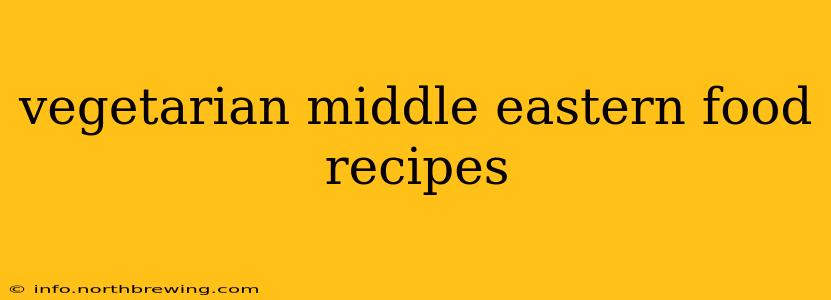Middle Eastern cuisine is renowned for its vibrant flavors and diverse array of dishes, and thankfully, many traditional recipes are naturally vegetarian or easily adaptable to exclude meat. This exploration delves into the heart of vegetarian Middle Eastern cooking, providing you with delicious and authentic recipes that will tantalize your taste buds. We'll cover a range of options, from hearty main courses to flavorful sides and delightful desserts, all perfect for a weeknight dinner or a special occasion.
What are some popular vegetarian Middle Eastern dishes?
This is a question frequently asked by those new to exploring this rich culinary tradition. Many classic Middle Eastern dishes are naturally vegetarian, showcasing the abundance of fresh vegetables, legumes, and grains found in the region. Popular examples include:
- Falafel: These deep-fried chickpea fritters are a staple across the Middle East, often served in pita bread with hummus, tahini, and various salads.
- Muhammara: A vibrant red pepper and walnut dip, bursting with flavor and often served as an appetizer or spread.
- Baba Ghanoush: A creamy eggplant dip, smoky and delicious, often served with pita bread or vegetables.
- Hummus: Probably the most internationally recognized Middle Eastern dish, this chickpea dip is incredibly versatile and adaptable.
- Various vegetable stews and tagines: These are hearty and flavorful, often incorporating chickpeas, lentils, and a variety of seasonal vegetables.
- Rice dishes: Rice plays a significant role in Middle Eastern cuisine, often prepared with aromatic spices and herbs.
What are some easy vegetarian Middle Eastern recipes?
While some dishes might seem complex, many vegetarian Middle Eastern recipes are surprisingly simple to prepare. Here's a focus on easier recipes to get you started:
Simple Hummus Recipe:
This recipe showcases the simplicity and deliciousness of this staple.
Ingredients:
- 1 can (15 ounces) chickpeas, rinsed and drained
- 1/4 cup tahini
- 1/4 cup lemon juice
- 2 cloves garlic, minced
- 1/2 teaspoon salt
- 1/4 cup water (or more, to reach desired consistency)
- 2 tablespoons olive oil, for drizzling
- Paprika, for garnish
Instructions:
- Combine chickpeas, tahini, lemon juice, garlic, and salt in a food processor.
- Blend until smooth, adding water as needed to reach your desired consistency.
- Drizzle with olive oil and sprinkle with paprika before serving.
Quick Muhammara:
This vibrant dip comes together quickly and beautifully.
Ingredients:
- 1 cup roasted red peppers (jarred is fine)
- 1/2 cup walnuts
- 2 tablespoons pomegranate molasses
- 1 tablespoon lemon juice
- 1 clove garlic, minced
- Salt and pepper to taste
- Olive oil, for drizzling
Instructions:
- Combine all ingredients in a food processor and blend until smooth.
- Adjust seasoning to taste.
- Drizzle with olive oil before serving.
Are there any vegetarian Middle Eastern desserts?
Absolutely! Middle Eastern desserts are often rich, sweet, and intensely flavorful. Many incorporate nuts, fruits, and honey. Here are a few ideas:
- Baklava (vegetarian versions exist): While traditional baklava often contains meat, many vegetarian variations use nuts and phyllo dough. Look for recipes that specifically state they're vegetarian.
- Knafeh (vegetarian versions exist): Similar to Baklava, some versions of this cheese-based pastry avoid meat-based ingredients. Again, check the recipe carefully.
- Fruit salads with honey and rosewater: A refreshing and simple dessert highlighting the region's fresh produce.
What are some tips for making vegetarian Middle Eastern food?
- Embrace the spices: Middle Eastern cuisine is all about bold flavors, so don't be afraid to experiment with spices like cumin, coriander, cinnamon, and turmeric.
- Use fresh herbs: Fresh parsley, mint, and cilantro add brightness and freshness to many dishes.
- Don't be afraid to substitute ingredients: Many recipes are adaptable, so feel free to substitute ingredients based on your preferences and what's available.
- Explore different types of lentils and beans: Lentils and beans are staples in Middle Eastern cooking and offer a wide variety of textures and flavors.
- Enjoy the process: Cooking Middle Eastern food should be a fun and enjoyable experience. Relax, experiment, and savor the delicious results!
This exploration provides a starting point for your journey into the world of vegetarian Middle Eastern food. With its rich history and diverse flavors, this cuisine offers a wide range of delicious and satisfying options for vegetarian eaters of all levels of culinary expertise. Remember to explore further and discover your personal favorites!
